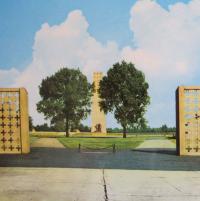JUDr. Kuneš Sonntag
* 1919 †︎ 2010
-
“We were drafting documents in French for the delimitation committee. If Střelice had been reverted (to the Second Republic), the neighbouring village, where there was the church as well as graveyard for Střelice, would have remained German. And they would have no way of getting to Uničov, except via Střelice. Therefore, we came up with the idea of a peage road. There were guarantees and it worked. There were never any clashes, nothing like that. Germans were walking through the Czech village, and Czechs were going to church in the Sudetenland. It was quite complicated and difficult, but it worked.”
-
“When the priest’s speech was over, we sang the anthem Where is My Home. Somebody started and we all joined in. It was allowed to sing it, just like today. When we finished, a group of people began singing the Lightning over the Tatras. These people were Slovaks who have remained faithful to Prague and who did not go to study to their new state, to Bratislava. For me, it was a spark which made me aware that there were awfully many of us. We did not wait any longer and we went to Prague. Policemen came against us in an open-roof Aero 30 car.”
-
“It was terrible. I was advancing with the undefeated army. Trust me, the men were crying. So was I. We were slowly passing through, cannons and all the stuff was were being pulled behind. Eventually we arrived to Uničov. The town was already decorated. Hakenkreuz and flags everywhere. The Germans were standing there. I remember that as a Boy Scout, I had been a leader of three troops. Two of them were absolutely in the German borderland, in Uničov and Šternberk. Šumvald was one of the five villages which have remained Czech in this mass of the German.”
-
“They began taking us for interrogations. I was led to an office on the right. A long room, and there was a desk inside, with a globe on it. The globe was made of glass, it was lit, and you could turn it around. They shoved me in this room and Mr. Frank was standing there. He gave me a welcome, saying, that I was ´one of the instigators of Czech pseudo-intelligentsia,´ and he accused us of having contacts with the Jew Beneš and of attempting to take down the order established by the Führer for eternity, and that we would be shot in the morning.”
-
“If you remember, Moravec, who was a colonel, was also a legionnaire, and during the final years of the First Republic era he was always publishing his forecasts in the Lidové noviny paper under the penname Yester, and praising France and our alliance. Now imagine what it was like for a young man when we walked through that corridor (we tried to get out somehow at the back, which we eventually managed with Pečenka), and a German officer was walking there and this Moravec – wearing a uniform of a Czechoslovak army colonel – was also there. The officer saluted him and Moravec responded: ´Heil Hitler!´ You know, that was a shock.”
-
“At two o’clock at night they were screaming at us and rushing us through the main gate. Arbeit mach frei, you know. They made us stand in rows of five and they did a preliminary headcount. Right after that they made us run to the apelplatz, to form a semi-circle, right in front of those barracks. There we already had to stay in orderly rows of five. It was already organized by prisoners there. Kapos? No, they were called camp elders. In Sachsenhausen, the word kapo was not used at all.”
-
Full recordings
-
V Litovli u pamětníka, 03.10.2009
(audio)
duration: 05:49:05
Full recordings are available only for logged users.
They shoved me into a cell and there I was interrogated by K. H. Frank
Kuneš Sonntag was born in Brno on August 17, 1919. His father (named Kuneš Sonntag as well) was a member of the Moravian Agrarian Party under the Austria-Hungarian Empire and he became the minister of finance after the establishment of the independent Czechoslovak Republic. For this reason, the family moved to Prague. However, after father’s death in 1931 the Sonntag family returned to Moravia to Střelice near Uničov. Kuneš Sonntag studied at the grammar school in Litovel. Among others, he met Jan Opletal there, who an excellent student and a member of Sokol. Kuneš was an active Sokol and a Boy Scout member as well. From 1937 he studied at the Law Faculty of Charles University in Prague and he became elected in the National Union of Czechoslovak Students. After Opletal’s funeral he was among the twelve Union officials who were arrested. Nine of them were executed by the Gestapo. The others were transported to the prison in Prague-Ruzyně and from there to the concentration camp Sachsenhausen. Kuneš Sonntag was released in 1942. After the war he worked in education and he supported the restoration of the university in Olomouc. In the 1950s he spent several years in prison for alleged high treason and espionage. He lived in the Haná region until his death in 2010 and he was an influential personage in the regional culture scene.
